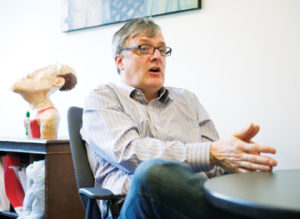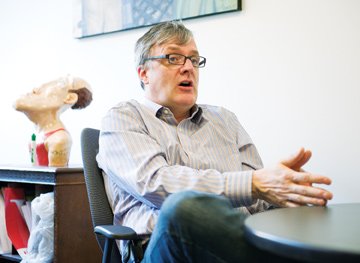Mark McKenzie
Staff Writer
Homelessness is everywhere.
It’s on our streets, and in most cases, it’s just around the corner. Even though it’s right in front of us, there are many questions that still need to be asked, explored and answered. Where there is a problem as heavy as this, you can be sure that influential minds are on the case.
Dr. Stephen Gaetz, associate professor and associate dean of research and field development in the faculty of education at York University is one of those minds fixed on the problem of homelessness. One of his main interests lies in youth homelessness – for those of you who think all homelessness is the same, Gaetz sets the record straight.

“Youth homelessness is different than adult homelessness, both in terms of the experiences of being homeless and in terms of becoming homeless,” Gaetz said. “Often, we treat homeless youth the same way we do adults.”
Gaetz believes the system for youth homelessness should focus mostly on the specific needs of young people. “People need to remember that growing into adulthood takes time. There are often setbacks – you know two steps forward, one step back,” he explained. “People go through emotional, physical, intellectual changes in their lives. Ideally, you want to build a system that operates under the assumption young people need support.”
Gaetz thinks the emphasis should be on preventing homelessness; no young person should be on the street in the first place, he said. “[In a perfect world,] when a youth becomes homeless, it would be your job as someone interested in their well-being to intervene right away and try to get them back home, because most of the time they can go back.”
Youth homelessness may start in the home for various reasons – they may have been mentally or physically abused, for example. It should be a common goal of these homelessness systems to prevent it. “The homeless sector developed because of the failure of these other systems,” Gaetz pointed out. “Don’t get me wrong, the welfare system does a lot of things well, but a lot of young people end up leaving care without a plan, without support, and the focus of the welfare system, if we were honest, is more on children because they don’t have a lot of resources, so their priority becomes mainly young children.”
Though there’s a strong focus on young people, the system obviously isn’t working very efficiently. “I think the system needs a lot of reform because no young person should leave care without support, and if we say that we want nothing to do with the child welfare system, I think that’s a big failure on society’s part,” Gaetz said. “So support means more than just getting them old enough so they can work at sub-minimum wage at some random job.”
“They need education, and that’s one of the things the system lacks. At about 16 to 18 years of age, the state has no obligation to provide education, and that’s wrong.”
While working at Shout clinic in Toronto for years, as well as in the government, Gaetz found that extensive research on the issue of homelessness is the way to go. “When I worked in this sector, people said we know what the problems are, we know the solutions, and that just wasn’t true,” he says. When York University took Gaetz on, he focused his research into mobilizing what institutions did know so that it’d have a bigger impact on policy and practice.
“Talk to the politicians,” Gaetz advises. “Policy needs to be driven with the practice of research. The public backs bad policy because they don’t know any better, and ultimately people need to realize that it’s not okay.”
“It’s one thing to say to people, this is bad. We need to do more than critique. If people knew that certain things could save them money such as housing the homeless, they would act. If people think homeless people are bad or lazy then they are less likely to help.”
York University plays a central role in homelessness research in Canada, and played host to the very first Canadian research conference on homelessness in 2005. The event drew over 800 policy makers and professors, but homeless people also attended – Gaetz wanted them to feel just as welcome at York as the researchers.
Following the conference, Gaetz and his fellow researchers developed the Canadian Homelessness Research Network, with a mandate to mobilize research knowledge so that it has a bigger impact on policy and practice. The network, centered at York, unites top researchers on homelessness in Canada and people from organizations fighting homelessness.
The resources are rich, and it is with the aid of people like Gaetz, who seek new research out there for absolutely everyone to have access to, that they will become even richer. “We don’t want to just restrict our research to academic journals; that stuff just doesn’t cut it sometimes,” he says. “The solutions are there, people just aren’t committed to them. That’s why all of this stuff matters.”
“When I publish research, I am trying to get it out to a wider audience rather than getting it into academic journals. I’m more likely to gravitate towards a public report that’s open access. People can debate about it, reject it, what have you, but talking about it is what counts.”
Gaetz had more advice for students who wanted to engage the issue. “On an interpersonal level, when you encounter someone who is homeless, treat them with the same respect you would anyone else. Look them in the eye and be nice. They’re so used to being disrespected, so don’t make assumptions about them,” he explained. “Ask politicians questions and learn about this. Engage in it, and as students at York, use the homeless hub.”
As Gaetz noted, the resources at York are abundant – it’s all about investing time. People always say they’re busy with this, busy with that, busy with important matters.
Isn’t this just as important as anything?
Stopping homelessness before it starts




